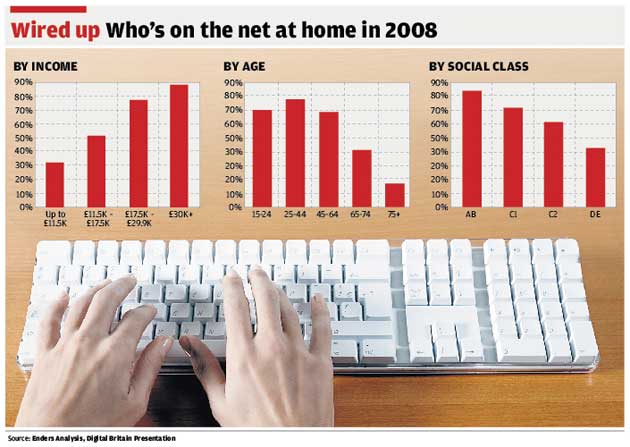Broadband for every household by 2011
Government action plan sets target for improved internet connection

Your support helps us to tell the story
From reproductive rights to climate change to Big Tech, The Independent is on the ground when the story is developing. Whether it's investigating the financials of Elon Musk's pro-Trump PAC or producing our latest documentary, 'The A Word', which shines a light on the American women fighting for reproductive rights, we know how important it is to parse out the facts from the messaging.
At such a critical moment in US history, we need reporters on the ground. Your donation allows us to keep sending journalists to speak to both sides of the story.
The Independent is trusted by Americans across the entire political spectrum. And unlike many other quality news outlets, we choose not to lock Americans out of our reporting and analysis with paywalls. We believe quality journalism should be available to everyone, paid for by those who can afford it.
Your support makes all the difference.A new era in which the entire population of Britain will be connected to broadband internet within three years has been unveiled by the Government. But the vision emerged amid growing concerns that Britain is falling behind other parts of the world in the battle to lead the way in digital technology.
The Communications minister Lord Carter set out a 22-point action plan that included a pledge to pressure internet companies to inform on web pirates, and a commitment to safeguard the future of Channel 4 as a second public service broadcaster.
Yet Lord Carter expressed fears that President Barack Obama's election would propel the United States to a new level of ascendancy in the use of digital technology and that Britain might also be left behind by fast-growing Asian economies and Nicolas Sarkozy's France, which has prioritised the development of its communications sector.
"Britain's competitive position as a user and producer of digital technology cannot be taken for granted," Lord Carter said in his Digital Britain report. "The European Commission's global league table of digital adoption, skills and use shows that the UK, having been in the top seven earlier in the decade, has slipped to 12th place."
Lord Carter, the former chief executive of the communications watchdog Ofcom, drew attention to the impact of Mr Obama on the US communications industry. "President Obama's technology-based American presidential campaign changed the face of US elections and the new President has made it clear that he sees both technology and a strong communications infrastructure as vital to economic recovery and growth."
The minister also reported admiringly on the French government's France Numérique 2012 plan, which he described as "an ambitious communications sector strategy designed to strengthen France's digital position and enhance its broader competitiveness at a time of global economic slowdown and crisis".
As Lord Carter set out targets for giving every British household a broadband connection with a minimum speed of 2Mbs and to cut illegal file-sharing by 80 per cent by 2011, industry figures echoed his concerns that Britain's digital revolution had stalled.
Danny Meaney, managing director of NMP, the media consultants on the Salford Media City project, stressed the need for decisive action, saying Britain had lost ground in the past five to 10 years. "We were in the top three in terms of fixed line connectivity; that was our best period," he said. "The level of investment has decreased over recent years and we have inevitably slipped back."
The National Endowment for Science, Technology and the Arts (Nesta), an independent body created to make the UK more innovative, said the Government needed to act "sooner rather than later". Help The Aged yesterday highlighted the difficulty of achieving universal connectivity by pointing out that seven out of 10 of the over-65s in Britain have never used the internet.
Presenting the Digital Britain report to parliament, the Culture Secretary Andy Burnham told MPs that Britain "leads the world in content creation", while the report itself said the digital economy accounted for about 8 per cent of GDP. The Prime Minister said digital technology was now as "important as roads, bridges and trains were in the 20th century".
Opposition politicians attacked this interim version of Digital Britain (Lord Carter will produce his final report in the summer) for its lack of concrete proposals. The Liberal Democrat culture spokesman Don Foster described the report as a "damp squib", criticising its "complete lack of ambition". The Tories' culture spokesman Jeremy Hunt was scornful of Lord Carter's target of universal connection to a minimum broadband speed of 2Mbs, saying the national average was already 3.6Mbs.
Lord Carter's sympathy for a tie-up between Channel 4 and BBC Worldwide to create a sustainable second public service broadcaster was greeted enthusiastically by Andy Duncan, Channel 4's chief executive. He said talks were already under way with the BBC's commercial arm and that there was "real desire and momentum to deliver a material partnership, which we believe can deliver the greatest cultural and economic benefit for Britain."
Join our commenting forum
Join thought-provoking conversations, follow other Independent readers and see their replies
Comments